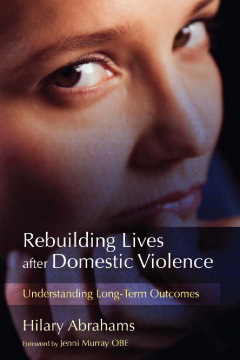
Additional Information
Book Details
Abstract
Rebuilding Lives after Domestic Violence examines in-depth the long-term outcomes for women who have suffered domestic violence and abuse, based on interviews conducted over seven years.
Through these interviews the author reveals the factors which help or hinder a successful transition from abusive relationship to independent living. The women interviewed provide an insight into the lengthy and difficult process of rebuilding their lives, and offer messages and advice to those working with women who have endured similar experiences. The author examines issues the women commonly face such as finding safe and independent accommodation, building practical and emotional support systems and relationships, and issues surrounding their children. She also discusses service provision and draws together the factors that contribute to a successful and independent life.
This unique book will be essential reading for all those involved in working with women who have experienced domestic violence and abuse as well as those responsible for service provision and policy development.
Hilary Abrahams is an Honorary Research Fellow at the Centre for Gender and Violence Research at the University of Bristol. She has worked extensively on the support needs and service provision for families where domestic violence is an issue, including a major research project evaluating the housing and support schemes funded by the Safer Communities Supported Housing Fund.
It is a well-structured book, with good chapter summaries and lists of key points at the end of each chapter, and a resource list of useful organisations and websites. The particular value of refuges and then social housing comes across throughout the book... The conclusions are life-affirming. All the women had developed a sense of personal worth, inner strengths and a determination to achieve, felt in control of their lives and able to take personal responsibility.
CAFCASS
This is a longitudinal study of the effects of domestic violence and abuse on the lives of 12 women. They were interviewed first when they were in refuges, then six months later, then a few years after that. This is the book's unique selling point, as most studies cover a much shorter timescale... The author's respectful, acceptant and honest approach models the guiding principles of working with women whose self-esteem and sense of safety have been shattered by domestic violence and abuse... This is a really useful resource for inexperienced and trainee counsellors. It is written in clear and direct language and is well structured, with bulletpointed summaries at the end of each chapter and a useful list of organisations and their websites in an appendix... The closing chapters of the book- in which the women look forward to brighter futures- powerfully validate the work of services which do not give up on those who live with domestic violence and abuse, difficult and draining as the work may be.
Therapy Today (http://www.therapytoday.net)
